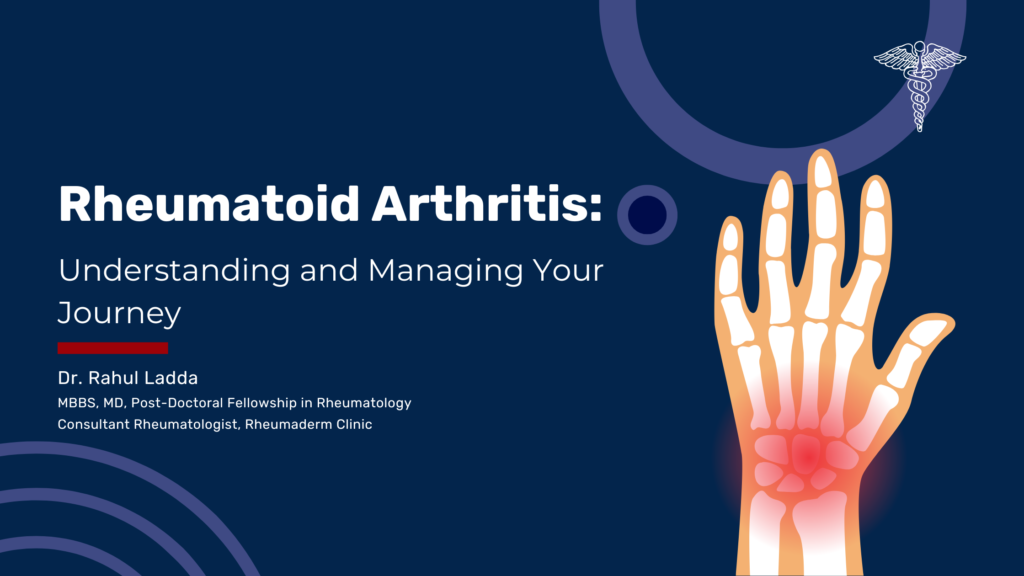Rheumatoid Arthritis: Understanding and Managing Your Journey

Rheumatoid arthritis (RA) is more than just joint pain—it’s a complex autoimmune disease that can significantly affect your quality of life. As a rheumatologist, I understand the challenges this condition brings. My goal with this blog is to empower you with knowledge about RA and provide actionable steps to manage it effectively.
What Is Rheumatoid Arthritis?
Rheumatoid arthritis is an autoimmune condition where the immune system mistakenly attacks the synovium—the lining of your joints. This results in inflammation, pain, swelling, and, if untreated, progressive joint damage. Unlike osteoarthritis caused by wear and tear, RA can affect individuals of any age, even young adults.
Common Symptoms:
- Persistent joint pain, swelling, and stiffness (especially in the morning or after inactivity).
- Fatigue and low energy.
- Warmth and redness around the joints.
- Symmetrical joint involvement (e.g., both wrists or knees).
RA can also impact other organs, such as the eyes, lungs, and heart, underscoring the importance of comprehensive care.
What Causes RA?
While the exact cause remains unclear, several factors contribute to the development of RA:
- Genetics: A family history of autoimmune diseases can increase your risk.
- Environmental Triggers: Smoking, infections, and stress may trigger RA in susceptible individuals.
How Is RA Diagnosed?
Diagnosing RA requires a combination of clinical evaluation, lab tests, and imaging:
Blood Tests:
- Rheumatoid factor (RF) and anti-cyclic citrullinated peptide (anti-CCP) antibodies.
- Inflammatory markers like ESR (Erythrocyte Sedimentation Rate) and CRP (C-Reactive Protein).
Imaging:
- X-rays, ultrasound, or MRI to detect joint inflammation and damage.
Early diagnosis is crucial to prevent long-term joint damage and improve outcomes.
Managing Rheumatoid Arthritis
The good news? Advances in modern medicine and lifestyle modifications can help manage RA effectively.
Medications:
- Nonsteroidal Anti-Inflammatory Drugs (NSAIDs): Alleviate pain and inflammation but do not halt disease progression.
- Corticosteroids: Offer quick relief during flares but are best used sparingly.
- Disease-Modifying Antirheumatic Drugs (DMARDs):
- Methotrexate: The gold standard for slowing disease progression.
- Other DMARDs like leflunomide, sulfasalazine, and hydroxychloroquine.
- Biologic Agents: Target specific immune pathways, such as TNF inhibitors (adalimumab) or IL-6 inhibitors (tocilizumab).
- JAK Inhibitors: Oral medications like tofacitinib for advanced cases.
Exercise and RA
Exercise is a cornerstone of RA management, helping reduce stiffness, maintain joint flexibility, and improve overall health.
Recommended Exercises:
- Range-of-Motion Exercises: Gentle stretches like wrist circles and shoulder rolls to maintain flexibility.
- Strengthening Exercises: Builds muscle to support joints (e.g., resistance bands or bodyweight exercises).
- Low-Impact Aerobic Activities: Swimming, walking, or cycling to boost heart health without stressing joints.
- Yoga: Enhances flexibility, balance, and mental well-being.
Tips for Exercising:
- Warm up to loosen joints before starting.
- Start slow and increase intensity gradually.
- Rest during flares, but stay as active as possible.
- Consult a physical therapist for personalized routines.
Coping with RA: You’re Not Alone
Living with RA can be challenging, but support and resources are available:
- Join Support Groups: Connect with others who understand your journey.
- Educate Yourself: Knowledge empowers you to advocate for your care.
- Lean on Family and Friends: Openly communicate your needs and seek their support.
Looking Ahead
While RA has no cure, advancements in treatments have transformed it from a debilitating condition to one that is manageable. Early intervention, consistent care, and a proactive approach can help you lead a fulfilling life.
If you have any questions or concerns about your RA or treatment options, don’t hesitate to reach out. Together, we can develop a plan tailored to your needs and goals.
Remember: You are not just a patient—you are a partner in your care.
Let’s take the first step together.
For appointments, visit Rheumaderm Clinic or book your visit online


